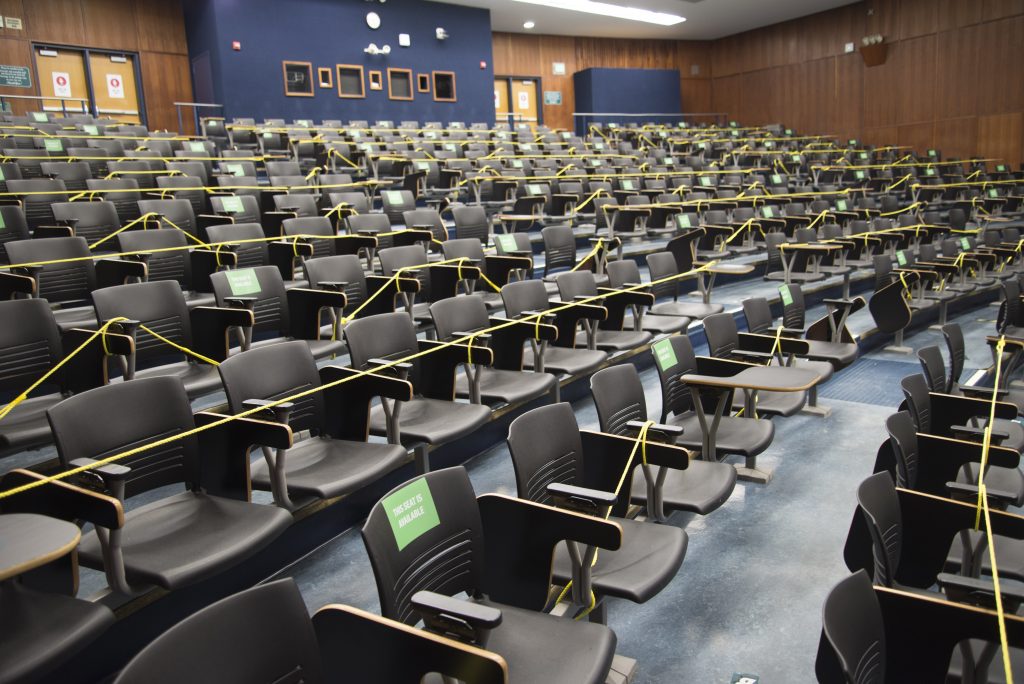With the beginning of the spring 2021 semester, Binghamton University has made adjustments aiming to provide an improved learning experience compared to the fall 2020 semester.
BU sent out Student Opinion of Teaching (SOOT) surveys to students last semester requesting responses on their experience with remote learning. Based on the responses, some of the changes that BU has undertaken for the new semester include reducing the number of asynchronous, or non-live, courses and putting a higher emphasis on student-faculty engagement.
Donald Nieman, executive vice president for academic affairs and provost, said the SOOT surveys sent out to students helped the teachers shape what will be done for their classes in the upcoming semester.
“Faculty members use the feedback they receive on SOOTs to judge what was effective and what was not,” Nieman wrote in an email.
Nieman explained that BU had to rework asynchronous courses to provide some live experience, which he believes will benefit students.
“One thing we heard from students is that courses that are completely asynchronous — that they offer no real-time interaction with faculty — were not effective,” Nieman wrote. “As a result, we have required faculty members whose courses have an asynchronous component to hold class sessions where they can interact with students in real time.”
Nieman added that BU has worked to focus on students’ well-being, specifically pointing to the three rejuvenation days added to the academic calendar with the hope of alleviating some of the stress a semester with no long breaks can cause.
“We also heard from students that long lectures made it easy to be distracted, so many instructors have broken lectures into shorter modules,” Nieman wrote.
Joshua Dorfman, vice president for academic affairs for BU’s Student Association (SA) and a junior majoring in integrative neuroscience, praised BU’s ability to help the SA transition its resources and programs from a physical to an online environment.
“Since the beginning of the [fall 2020] semester, the SA has done many things for students, such [as] moving our resources online, which includes our online waiting room and utilizing Zoom calls,” Dorfman said. “[The SA has] also done advocacy for an ample supply of electronics for learning and online testing. [In addition,] we’ve worked with [Harpur College of Arts and Sciences] and various advising groups to get online one-on-one meetings and were able to get the spring semester schedule pushed back by one week since this will avoid the conflict of having to move out of [dorms] while taking final exams. Nothing we had in the past was taken away.”
Dorfman added that the University’s transition to the online learning environment came with more transparency in various procedures, such as remote learning and health protocol.
“[BU] has done a good job with the transition to remote learning compared to other nationwide universities, especially with [BU’s] openness and ability to communicate with what is being done as time goes by,” Dorfman said. “[BU] has also provided a lot of clarity in class registration.”
Matthew Manberg, an undeclared freshman, said while it is beneficial for BU to bring a live component to the asynchronous courses, professors should still work to establish relationships with their students, namely classes with a high student population.
“Classes that are completely online create an environment without intimacy, especially perpetuated by [larger classes], like chemistry,” Manberg said. “When a student feels like they are just a number, they are less likely to be intrinsically motivated to learn. My suggestions for BU would be to try to foster student-teacher relations through encouraging ways, such as applicable projects and student-teacher checkups.”
Jane Dexter, an undeclared freshman, also agrees that BU’s incorporation of a live component to asynchronous courses will be helpful and said it will help students that are struggling to learn.
“I have more asynchronous classes this semester, and, so far, I am doing fine with the format,” Dexter said. “I have one synchronous class, and the interaction with the teacher helps a lot, so I feel [such] classes would be better.”
Noelle Dutch, an undeclared freshman, said she is excited this semester compared to last, especially with the implementation of rejuvenation days and being able to have more in-person courses.
“Having days off provides students with an extra break to catch up on work or relax,” Dutch said. “I [do] think it’s difficult to make online discussions immersive, but this semester I am excited to have more in-person classes than last.”



